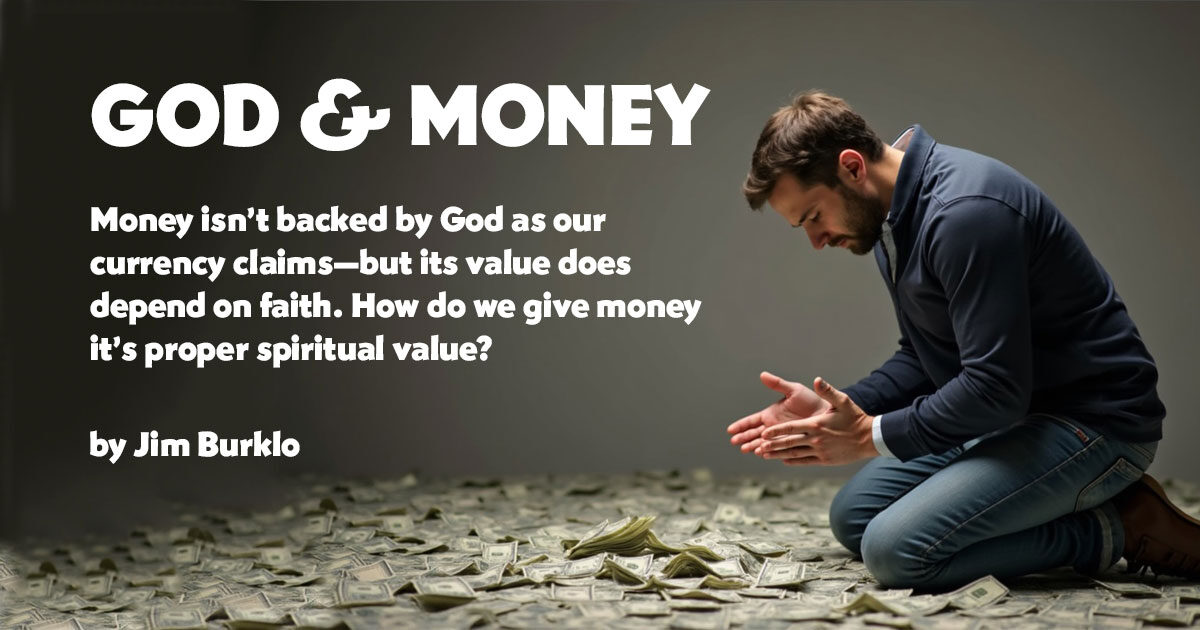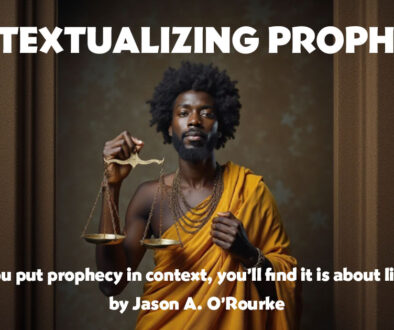God & Money
by Jim Burklo | 11 June 2025 |
What is money? Cryptocurrencies push the question up in our faces. The “crypto” in cryptocurrency means “hidden” – obscured.
But in a way, all money is cryptocurrency. What is a dollar, really? Ultimately a dollar is worth what people believe it is worth—it has little intrinsic value in itself. Now that we have a president who is spectacularly inept at managing the economy with his wild turnarounds on tariff policy, and now that Congress is about to add trillions of dollars to the government budget deficit—funded by selling dollar bonds to governments and investors all over the world, which amounts to the government “printing” more money—people around the planet are beginning to question the stability of our currency.
The value of a dollar is a figment of the collective imagination of humans. It is a habit of mind that can change. The dollar is getting more “crypto” by the day.
There’s something religious about money. When you get to the root of it, money is the quantification of trust—of faith, if you will. You put a twenty-dollar bill in your wallet and you trust that it will be worth something when you go to the store. You trust your employer to tell its bank to send a number to your bank, and you send numbers from your bank to the banks of the companies that provide you with the stuff you want to pay for, and you trust that they will follow through.
Money has a sacred quality
Our cash is printed with the words “In God we trust,” promoting the fiction that there is supernatural backing for its value—a backing that most assuredly isn’t there whether or not you believe in God! If we were honest, we’d have these words printed on our money: “Just trust that this piece of paper is worth something.”
Money isn’t divine. But there is something divine about maintaining trust and faith in each other. Children trusting their parents to take care of them—that is a sacred trust. Neighbors trusting neighbors to pitch in and help in times of crisis—that’s a sacred kind of trust. The trust we put in each other in our churches is holy. And the institutions we create to enable our economy to run smoothly and predictably—even that necessitates a sacred trust.
The global financial system, precarious as it is, is backed up by little but habits of mind. It inspires both awe and suspicion—especially now, as we are getting a look behind the curtain to see the very flawed humans turning the cranks and pushing the levers that generate its illusions. The weirdness of cryptocurrency and the peculiar characters behind it practically beg us to do what Dorothy did by pulling aside the curtain and exposing the Wizard of Oz for who he really was.
How do we change the money system so that it serves humanity more equitably and humanely, without tearing away the delicate filaments of trust that hold it all together? At its root it is a religious question, a spiritual question. How we make and spend money—that’s a matter of morality. How we structure the way money is created and how money flows—that’s a matter of a morality founded on spirituality. How does love move us to gain and distribute money—both as individuals and collectively?
Money itself is not sacred, nor are the banks and financial institutions through which it moves—but the trust that gives money value has a sacred quality which we must hold precious even as we demand reforms to the financial system to achieve greater economic justice. We’re going backwards on this front today, but soon enough we’ll have the chance to elect politicians who can move us forward on economic justice.
Zacchaeus
In the gospel story about him, people hated Zacchaeus because of his ill-gotten gains. Tax collectors in the Roman empire effectively were robbers: they were assigned an amount that they had to deliver to the Romans, and they were set loose to gather it up by hook or crook—backed up at sword-point—and keep whatever extra they collected in the process. We can be sure that Zacchaeus set neighbors against neighbors, getting them to rat each other out about who had more money than whom, so he could extort as much as possible from all of them.
Zacchaeus was a cog in a machine that tore apart the filaments of trust between people, which is why folks were boggled when Jesus invited himself to dinner with this social pariah. Jesus inspired him to pay back what he had extorted from people. Jesus’ mission was to restore trust among people, to inspire people to forge communal relationships that would enable them to thrive. His encounter with Zacchaeus was a microcosmic reform of the money system of the day, moving its needle in the direction of economic justice.
Let’s do our part toward the same end today.
 Jim Burklo is an ordained United Church of Christ pastor. In 2022 he retired after 14 years as the Senior Associate Dean of Religious and Spiritual Life at the University of Southern California. He now serves as pastor of the United Church of Christ in Simi Valley, California. He also serves as executive director of Progressive Christians Uniting/ZOE: Progressive Christian Life on Campus, a national network of progressive Christian campus ministry groups. Jim is the author of seven published books on progressive faith: the latest is Tenderly Calling: An Invitation to the Way of Jesus (St Johann Press, 2021). His weekly blog, “Musings,” has a global audience. Jim and his wife, Roberta, live in Ojai, California.
Jim Burklo is an ordained United Church of Christ pastor. In 2022 he retired after 14 years as the Senior Associate Dean of Religious and Spiritual Life at the University of Southern California. He now serves as pastor of the United Church of Christ in Simi Valley, California. He also serves as executive director of Progressive Christians Uniting/ZOE: Progressive Christian Life on Campus, a national network of progressive Christian campus ministry groups. Jim is the author of seven published books on progressive faith: the latest is Tenderly Calling: An Invitation to the Way of Jesus (St Johann Press, 2021). His weekly blog, “Musings,” has a global audience. Jim and his wife, Roberta, live in Ojai, California.




